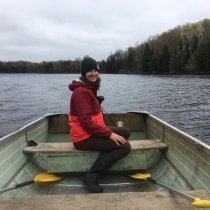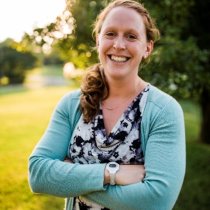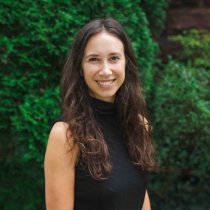Spotlight
Women in Ecology – Laura Steger
June 20, 2024
For our latest Women in Ecology interview, we spoke with Laura Steger, Environmental and Zoological Collections Manager for the NEON Biorepository at Arizona State University. Steger spent her childhood in nature, influencing her to continue in that environment and work with NEON, spending her time surrounded by different specimens and samples from many different ecosystems.
Can you tell us about your current role and what inspired you to become involved in your research?
I manage a variety of samples and specimens (plants, vertebrates, and other environmental samples) that are collected across the country through the U.S. National Science Foundation’s NEON Program, and I facilitate research by connecting scientists with those samples. I’m very fortunate to work with some of the fastest-growing collections in the U.S., honored to have the responsibility of ensuring that they are properly preserved and maintained for future generations, and privileged to work with researchers from around the world. As a collection manager, I often get a sneak peek at some of the questions the scientific community wants to answer, often way before anything is published, which is pretty neat.
I’m proud to be involved in the NEON Program for many reasons. For one, it’s the first observatory of its kind, a massive continental-scale network that is poised to collect resources to help us understand how U.S. ecosystems are changing over time. NEON also creates a unique opportunity for researchers at any stage in their career to tackle large research questions across space and time, regardless of their location, lab size, or funding status. Because NEON publishes nearly 200 free, online data products, and the Biorepository makes available to the research community over 100K physical samples archived annually (nearly 500K total currently), even the smallest lab has an incredible opportunity to tackle big questions.
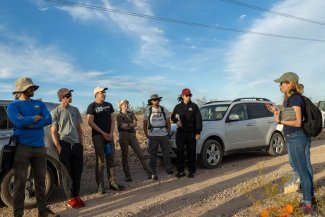
Steger teaching small mammal survey techniques near Tonopah, Arizona. Photo credit: Rick Overson.
In terms of my career path, it’s been very circuitous and nontraditional for an ecologist in academia, or really any researcher working in academia. I graduated from the University of Colorado, Boulder with a B.A. in Biology and Environmental Studies. For the last twenty years, I’ve bounced between academia and environmental consulting. Part of that is due to the ephemerality of academic funding and in part due to wanderlust and curiosity. During my undergraduate studies, I had the opportunity to work with two inspiring ecologists at Arizona State University - Dr. Jim Elser and Marcia Kyle. Both Jim and Marcia were incredibly patient, supportive, inclusive, caring, and brilliant scientists and mentors. They gave me a lot of opportunities, opened doors, and really kickstarted my career.
I’ve worked in much of the western U.S. and parts of Mexico on a variety of projects including developing and implementing aquatic baseline studies for proposed mines in Alaska, conducting small mammal surveys for federally listed species, investigating the stoichiometry of ciénegas in Mexico, and examining the ecological homogenization of urban America, to name a few. All of these projects gave me a lot of experience and exposure to different types of ecological studies, systems, and methods of research, particularly large-scale ecological research projects.
What keeps you motivated in your ongoing studies and dedication to this field?
Curiosity. The more we learn, the more we realize that there are so many things that we know very little about. Some of the most basic questions in science – such as where some species can be found and their life history – still remain unanswered. There is still a lot of work to do and that is exciting. For the moment, I’m interested in the shrews of the Pacific Northwest and disentangling the taxonomy of Sorex in that region. It’s the latest rabbit hole that I’ve fallen down. That is why I love science; there are so many rabbit holes all over the place.

Steger looking out over Clear Creek in Arizona. Photo credit: Rick Overson.
What is the most fun part about being an ecologist and what is the most challenging?
The most fun is being able to work in amazing places with incredible scientists, often on large, transdisciplinary teams. You get to learn new methods, new skills, and different approaches to answering questions. I very much enjoy working in a field that pushes me to keep learning.
One challenge though is that funding in academia is often very competitive and hard to acquire. It can be very ephemeral – you might be working on projects for two to three years, and then the funding is over, so you must move on to the next. There can be a lot of bouncing around, which can be difficult. It can be an intense period because you’re trying to answer a very large question or questions within a short period of time, so you’re collecting a lot of data, analyzing that data, and trying to publish in a very small timeframe. It can be stressful, but also incredibly rewarding.
What challenges have you faced in the field of STEM, what advice would you give?
I think we’ve made some progress as there are more opportunities opening up for young women, but the leaky pipeline still exists. The academic community has been successful at front-loading STEM fields - increasing class enrollment and participation - and we see this in the numbers. Unfortunately, we are losing a lot of women along the way. This is due to a variety of challenges that women face, one of them often being gender bias. This is something that we all face, and for women it can lead to subtle exclusions, having to provide more evidence of competence, being passed over for promotions, feeling pressured to play a traditionally feminine role, and isolation. I have experienced some of these, but I’m lucky to have colleagues and family who have helped me along the way, particularly my husband, Rick, and my mom. Honestly, I didn’t expect to have to defend my place, my voice, my ideas, and my value so much. So, my advice to young women is to be aware that the road ahead might be difficult at times but always remember that your voice matters, to speak up, and never forget that you belong here. Don’t be afraid to ask questions, ask for help, and ask for promotions. Surround yourself with people that value you and your ideas and keep pushing forward.
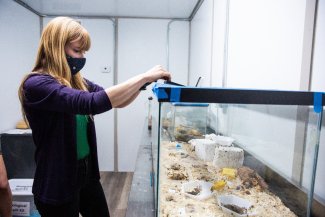
Steger checks on the dermestid beetle colony, which is used to clean small mammal skulls and skeletons at the NEON Biorepository. Photo credit: Deanna Dent/Arizona State University.
Are you confident that the scientific community will be able to solve the world's biggest ecological issues? What barriers do you think need to be removed in order to do so?
Humans are incredibly smart and innovative, and I have no doubt that we will find solutions to some of these big problems. But the issue is perhaps not so much in finding the solution as it is in implementing the solution to solve the problem, and that will require an immense amount of collaboration and cooperation. There are many issues on people’s minds right now besides the large issues that ecologists are focused on, such as job security, affordable housing, access to health care, food, and clean water. Because we all face different challenges and have different needs and values, developing solutions will require transdisciplinary teams that, very importantly, include social scientists.
Are there any specific areas of research that you would like to work on more or see additional future investment?
I think we need to invest more in opportunities for people to participate in science—to be a part of the conversation and contribute to research. We need more science communicators, more outdoor programs for kids and adults, more opportunities for people to get outside and feel safe doing so, and more inclusive research. Investing in areas that allow people to thrive (e.g., good jobs, quality health care) and feel connected to nature is, in my opinion, critically important for creating a system that provides time and space for all people to learn about, connect with, invest in, and care for the Earth. It’s difficult to ask people to care about the planet if they feel like the planet doesn’t care about them.

